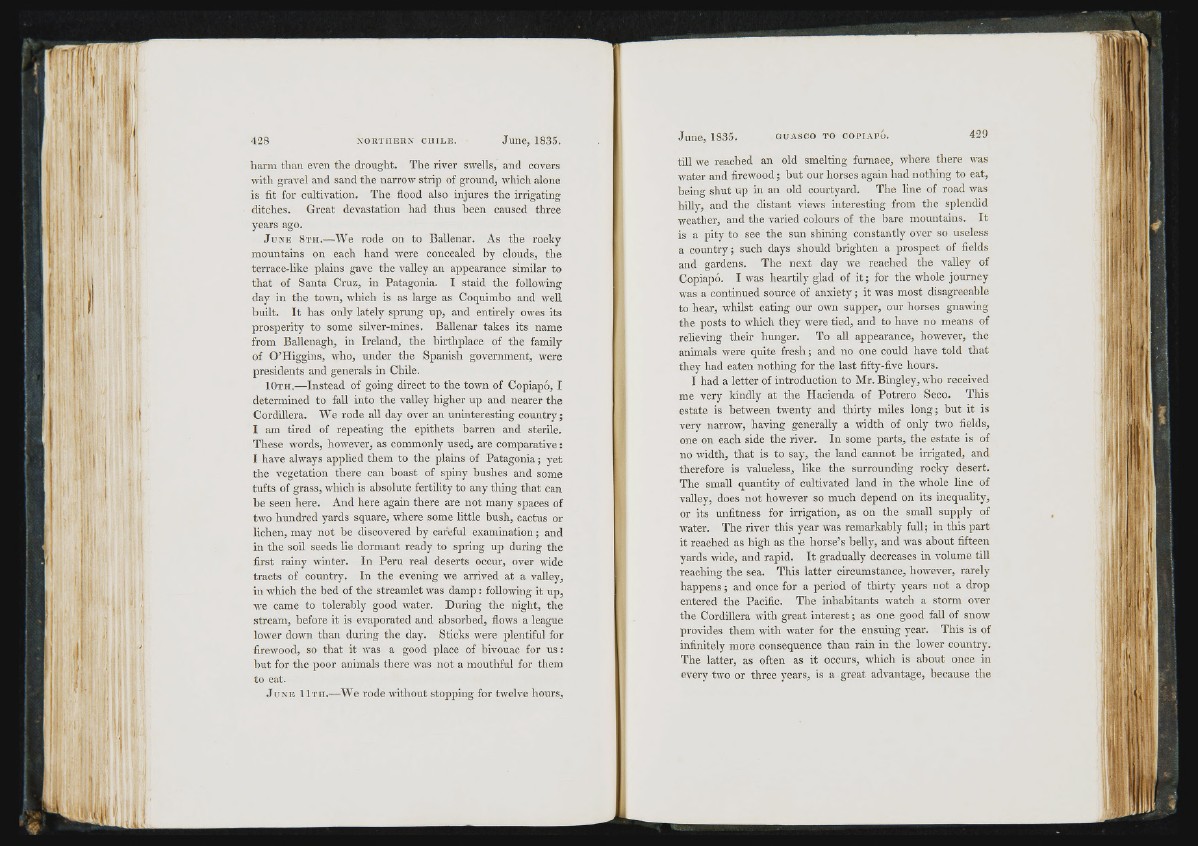
■IT '
X O R T I I E R X C H I L E . June, 1835.
harm than even the drought. The river swells, and covers
with gravel and sand the narrow strip of ground, which alone
is fit for cultivation. The flood also injures the irrigating
ditches. Great devastation had thus been caused three
years ago.
J une 8th.—W e rode on to Ballenar. As the rocky
mountains on each hand were concealed liy clouds, the
terrace-like plains gave the valley an appearance similar to
that of Santa Cruz, in Patagonia. I staid the following
day in the town, which is as large as Coquimbo and well
built. It has only lately sprung up, and entirely owes its
prosperity to some silver-mines. Ballenar takes its name
from Ballenagh, in Ireland, the birthplace of the family
of O’Higgins, who, under the Spanish government, were
presidents and generals in Chile.
1 0 t h .— Instead of going direct to the town of Copiapo, I
determined to fall into the valley higher up and nearer the
Cordillera. We rode all day over an uninteresting country;
I am tired of repeating the epithets barren and sterile.
These words, however, as commonly used, are comparative:
I have always applied them to the plains of Patagonia; yet
the vegetation there can boast of spiny bushes and some
tufts of grass, which is absolute fertility to any thing that can
be seen here. And here again there are not many spaces of
two hundred yards square, where some little bush, cactus or
lichen, may not be discovered by careful examination; and
in the soil seeds lie dormant ready to spring up during the
first rainy winter. In Peru real deserts occur, over wide
tracts of countrj'. In the evening M'e arrived at a valley,
in which the bed of the streamlet was damp : following it up,
we came to tolerably good water. During the night, the
stream, before it is evaporated and absorbed, flows a league
lower down than during the day. Sticks were plentiful for
firewood, so that it was a good place of bivouac for u s :
but for the poor animals there was not a mouthful for them
to eat.
J une 11th.—We rode without stopping for twelve hours.
June, 1835. G U A S C O t o C O I ’ I A I ’O.
till we reached an old smelting furnace, where there was
water and firewood; but our horses again had nothing to eat,
being shut up in an old courtyard. The line of road was
hilly, and the distant views interesting from the splendid
weather, and the varied colours of the bare mountains. It
is a pity to see the sun shining constantly over so useless
a country; such days should brighten a prospect of fields
and gardens. The next day we reached the valley of
Copiapo. I was heartily glad of i t ; for the whole journey
was a continued source of anxiety; it was most disagreeable
to hear, whilst eating our own supper, our horses gnawing
the posts to which they were tied, and to have no means of
relieving their hunger. To aU appearance, however, the
animals were quite fresh; and no one could have told that
they had eaten nothing for the last fifty-five hours.
I had a letter of introduction to Mr. Bingley, who received
me very kindly at the Hacienda of Potrero Seco. This
estate is between twenty and thirty miles long; but it is
very narrow, having generally a width of only two fields,
one on each side the river. In some parts, the estate is of
no width, that is to say, the land cannot he irrigated, and
therefore is valueless, like the surrounding rocky desert.
The small quantity of cultivated land in the whole line of
valley, does not however so much depend on its inequality,
or its unfitness for irrigation, as on the small supply of
water. The river this year was remarkably full; in this part
it reached as high as the horse’s belly, and was about fifteen
yards wide, and rapid. It gradually decreases in volume tiU
reaching the sea. This latter circumstance, however, rarely
happens; and once for a period of thirty years not a drop
entered the Pacific. The inhabitants watch a storm over
the Cordillera with great interest; as one good faU of snow
provides them with water for the ensuing year. This is of
infinitely more consequence than rain in the lower country.
The latter, as often as it occurs, which is about once in
every two or three years, is a great advantage, because the